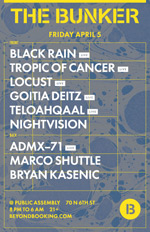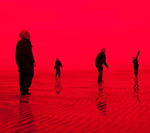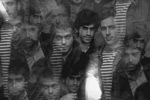| |
|
|
|
|
|
|
| |

$39.99 CDx4

 |
|
CATHERINE RIBEIRO + ALPES
4 Original Albums
(Universal France)
 "Roc Alpin" "Roc Alpin"
 "Un Jour... La Mort" "Un Jour... La Mort"
French vocalist and actress Catherine Ribeiro has long been one of my favorite singers and songwriters, and I'm thrilled to finally be able to offer up this excellent collection of four of her most bewitching, mind-altering albums. Though she began as a yé-yé singer in the vein of Francoise Hardy, and is best known to many via her role in Jean-Luc Godard's Les Carabiniers, by the time Ribiero released her 1969 debut LP Catherine Ribeiro + 2Bis (not included here and never given a proper reissue) she had undergone a powerful transformation, crafting a haunting, alien soundworld that is definitely of its time, so to speak, while being starkly original and timeless. Her main collaborator on that debut was multi-instrumentalist, actor, and craftsman/inventor Patrice Moullet, and they went on to form Alpes, a revolving troupe of sonic alchemists who backed Ribiero on a series of varied albums that all fused blackened lyrical themes and solemn folk instrumentation with droning psychedelics and a bit of acid rock. Musically adventurous and sonically thrilling, this music is carried by Ribeiro's earth-moving voice -- a force to be reckoned with -- that sounds as though it can blast a hole through brick walls; she carries heavy emotion, and a lower register expressivity that in layman's comparative terms could be a splice of Grace Slick, Brigitte Fontaine, and Yoko Ono.
Alpes quickly moved from the droning acid rock of their 1970 debut, No 2, to something altogether more intriguing and bewitching on 1971's Ame Debout, with the arrival of Moullet's handmade instruments the cosmophone (a modified, custom-made viola da gamba crafted from aluminum and played with a bow, sounding like a blend of harp, bass, and guitar) and the percuphone, a steel-stringed instrument played via a mechanical motor which produces the unique, tuned rhythms that anchor their wild cosmic flights. Atop this bed are spiraling clouds of electric organ that evoke Terry Riley's A Rainbow in Curved Air, and long, spiraling passages of bass and guitar. Each instrumental element seems to dance alongside and in between the others, never touching or interlocking into a groove, but instead crafting a complex tapestry of texture and melody that is simply hypnotic. This album above all others gives ample showcase to the textural delights of Moullet's inventions, with a handful of instrumental showcases, and overall shorter average track length. This is the group at their most concise, yet while all players are in top form here, their best work was still to come.
By the time of Paix, released in 1972, they'd seemingly perfected the chemistry and formula, and distilled it into four incredible dispatches that many regard as their masterpiece statement. The album begins with two shorter pieces more rooted in rock modes, with opener "Roc Alpin" even featuring proper drums. After the echoing folk lullaby "Jusqu'a Ce Que La Force De T'Aimer Me Manque," they break out the big guns; the LP's title track enters on a scuttling percuphone rhythm and a slow-creeping organ melody that's mirrored by the guitar, until Ribeiro appears about six minutes in with a forceful spoken word declaration that evolves into wordless eerie cries that again mirror the memorable melody that haunts the 16-minute piece. The epic 25-minute closer "Un Jour... La Mort" begins on plectrum-plucked single bass notes and gently strummed guitar lines atop a shadowed organ drone, until Ribeiro delivers a spectral hymn that evolves into a sun-bleached beckoning of the heavens, as rhythms interlock and strings spiral upward, until the vision of Death whom she is describing enters the ballroom that she is currently haunting. She dances with Death and a choir of voices cry, scream, and moan with her as she reaches a higher plane; it's a trip like no other.
The collection is capped off with 1974's Le Rat Dèbile Et L'Homme Des Champs, which follows the four-song structure of Paix, but opts for an altogether more kinetic palette, with tempos somewhat accelerated and yet at the same time atmospheres feeling more gaseous and light in texture, despite the increase in percussion throughout. In many ways the album sounds like an encapsulated summation of the three that came before it, concentrating all of the key ingredients into a deep séance that haunts, yet bleeds.
It goes without saying that I consider this an essential cornerstone of any psychedelic music collection, yet what I love so much about Ribeiro and Moullet's work is the way that it refuses to slot easily into any one genre or category. This could easily be considered folk, psych, or experimental, and sits nicely next to works by Brigitte Fontaine, Scott Walker, Nico, Death in June or Current 93, even Antony and the Johnsons. Ribeiro has long been under-recognized outside of cult circles, and anyone who finds what I've described here even the slightest bit bewitching owes it to themselves to check this music out PRONTO. Her work has been sorely unavailable for decades, and these are the first legit, non-bootleg editions of many of these albums, so even if you have the old CD imports, you don't have them in sound quality this clean and undisturbed. It's also a steal of a deal, costing less than a single copy of one of the original LP pressings will set you back. What more do I need to say, folks? This is the essence of what an IQ 'highest recommendation' represents.
[IQ] |
|
| |
|
|
|
|
|
|
|










































